This review was originally published in The Washington Examiner.
With March Madness coming to a close, HBO’s release of its series Winning Time: The Rise of the Lakers Dynasty couldn’t be better timed. Or more anticipated. Most films about sports fail for one and the same reason: they turn athletics into Lifetime redemption stories drenched in sentimentality. Instead of blood and guts, audiences get melodrama. Rather than complexity, we’re served empty, archetypal heroism.
This goes for beloved classics like The Pride of the Yankees (1942), The Natural (1984), and Field of Dreams (1989). It applies to Chariots of Fire (1981), Bang the Drum Slowly (1973) and (hard as Tom Hanks tries) A League of Their Own (1991). It obtains for newer offerings like Remember the Titans (2000), Seabiscuit (2003), and Million Dollar Baby (2004). And it even attends the basketball film Hoosiers (1986), a fan-favorite. This last entry has become required viewing for every Cinderella team since. The boys from Hickory win the state title and save Dennis Hopper from the bottle. How? Because they’re crew-cut All-Americans, that’s how.
At the same time, a film like Raging Bull (1980) flounders at the other end of the spectrum—its obsessive brutality kills all joy. Contrary to its masterpiece status, Martin Scorcsese’s boxing picture goes down for the count. The director’s camerawork is rhythmic and kinetic, as usual. But he renders his anti-hero, Jake LaMotta (Robert De Niro), so raw and repulsive that the film suffers the opposite fate: there’s nothing redemptive about him. He lacks complexity, and his prizefights don’t entertain. Boxing is a dance of death—you have to capture both its beauty and its war (as playwright Clifford Odets does in his 1937 classic, Golden Boy).
The best sports films claw their way out of these traps. The original Rocky (1976) had a big heart that turned its underdog story into romantic comedy (its reboot franchise, Creed, rekindles that alchemy). Ron Shelton also used rom-com irresistibly in his 1988 baseball film Bull Durham. Carroll Ballard’s sublime lyricism in The Black Stallion (1979) paints horse racing as a boy-meets-beast coming-of-age tale, while 2010’s underrated Secretariat mined the sport for its old-school glory. Shelton’s football film The Best of Times (1986) uses the genius of Robin Williams to turn gridiron grit into infectious farce, while the same director harnessed Kevin Costner’s black humor for the sardonic golf picture Tin Cup (1996). In fact, Shelton succeeded where Scorcese flopped, making one of the most dark, complex, and neglected sports movies of all time with Cobb (1994)—a biopic starring Tommy Lee Jones (in his greatest performance) as the controversial baseball legend. Cobb is outshone only by Robert Towne’s Personal Best from 1982, which explores women track-and-field competitors in subtle, sensual, smart detail.
In a burst of creativity, Max Borenstein and Jim Hecht, the writers behind Winning Time, land on a different genre: working from a book by best-seller Jeff Pearlman, they turn the Lakers’ tale into a combination hard-boiled/backstage comedy. This is the most interesting work these writers have done. Despite a gripping performance from Gene Hackman (who wrings truth out of syrup) Hoosiers was doomed by maudlin inspirational tropes and gauzy photography. Such a style, you might argue, matched that of Fifties hoops. Yet as Dr. Jerry Buss (John C. Reilly) announces at the outset of the new show, playing—and watching—basketball should feel like making love. ““If there’s two things in this world that makes me believe in God,” he declares post coitus, “it’s sex and basketball.”
The series leads with Buss buying the Lakers in 1979 on a whim, blissed out on the idea of turning the team—and the NBA—into adult entertainment. Decamping from the Playboy mansion to close the sale, this is the magnate as epicure and impresario. He intuits that the league, on the verge of bankruptcy, must transform itself into spectacle to survive—turn staid Xs and Os into glitz and glamor. He sees sports as showbiz, with the emphasis on the show. The problem is that, as currently played, it’s a boring one—and he means that to change. A regular at nightclubs and resorts, Buss lives for life’s pleasures.
And in Earvin “Magic” Johnson, he sees his star. Having just led Michigan State to the NCAA Championship over Larry Bird, the dynamic point guard from Lansing intends to turn pro. Buss has his sights set on him as the sport’s scintillating savior, and wants to pick him in the draft. “I don’t care if you’re black, white, or polka dot,” he cries, “that kid makes you feel good!” When the owner brings Johnson to L.A. to toast the town, then, it’s a meeting of the minds. Borenstein and Hecht present these overgrown boys as kindred spirits—Magic wants nothing more than to spread the love, in basketball and in bed. He’s drawn to limelight, to nightlife, to pimps. And Buss is the biggest pimp of all. The Doctor, for his part, loves the young baller: his infectiousness, his ease, his good-times vibe. He takes the kid to a club where the pair oggles the showgirls. “I don’t know why basketball can’t feel like that,” Buss wonders. “To me,” Magic replies, “it do.”
The problems they face, however, are legion. Buss is broke, or nearly so, and has to hustle to squeeze the team’s current owner, Jack Cooke (Michael O’Keefe) into selling. When he does secure his claim, he faces resistance from old-dog executives habituated to losing—not to mention his volatile head coach, Jerry West (Jason Clarke). West, haunted by his failures as a player (his Lakers succumbed to the Boston Celtics innumerable times), has a streak of self-sabotage. Moreover, he hates the Johnson plan, insisting that the team already has a point guard. Magic’s too tall, too showy, too green. And he doesn’t score as many points as other picks. West thinks in terms of sabermetrics, while Buss is all about pizzazz.
In addition, the owner has to get the front office to reconceive the franchise as the razzle-dazzle repertoire he wants. He brings on his sprightly daughter, Jeanie (Hadley Robinson), who gets his seedy vision. But she’s a kid herself, unproven and unaccepted by the staff, led by Claire Rothman (Gaby Hoffman), the team’s general manager. Finally, Buss must contend with the big dogs among the league owners—especially Red Auerbach (Michael Chiklis), the imperious Boston mogul.
Meanwhile, Magic confronts his own set of obstacles. Though almost everyone eats from the palm of his hand, his mother, Christine (LisaGay Hamilton) chides him for his wayward ways. A Seventh Day Adventist, she refuses to call her son by his nickname, labeling “magic” the devil’s work. (“Devil can’t hoop like me, though!” Earvin quips.) She fears for his soul, scandalized by his sexual conquests, and he can’t find a way please her. And though Johnson scores with any girl he wants, he faces a dame he can’t crack in Earletha “Cookie” Kelly (Tamera Tomakili). His girlfriend at State, they’ve been sleeping together him when we meet her.
But Kelly, wise to the perils of a long-distance relationship, dumps him just as he’s set to ink the Lakers deal. Baffled, he can’t get the woman out of his head—unlike the ditzy broads who throw themselves at him, she’s smart, mature, and sees through his act. She cuts his ego down to size, and this makes him obsessed. When she starts dating a clean-cut guy, Johnson humiliates the rival in a pick-up game. The scenes between Tomakili and Isaiah channel the sharpest high school dramas.
He gets served on court himself by his new teammates. The series is astute to the tribal dynamics that infuse basketball, on court and off: the machismo, the trash talk, the rituals of dominance. Despite his winning charm, Magic meets with few friends on the squad, who see him as an upstart pup who must pay his dues. Norm Nixon (DeVaughn Nixon) feels threatened as the current point guard and schools Johnson in a one-on-one session at a high-society party. The 7’ 2” Kareem Abdul-Jabar—introduced by Solomon Hughes as a morose, gassed introvert—won’t give the rookie the time of day. He makes Johnson bring him orange juice every morning at training camp, which Magic sees as just another chance to convert a doubter.
It’s at camp in episode four, though, where everything starts to come together. Buss brings in a new coach, Jack McKinney (playwright Tracy Letts), who has the theory to match his desire and Magic’s instincts. He revolutionizes the team’s approach from the routine pick-and-rolls that the whole league plays into an explosive, exciting, seamless flow of action. Basketball baroque becomes basketball jazz. Though the veterans, led by West, resist, Johnson and Buss love it. So does the audience—you begin to see how modern basketball works, the intelligent design behind the random chaos. As the team takes off, you feel like you're launching to the rafters: this is the real space jam.
It’s the court and boardroom scenes where the hardboiled style comes alive. The executives, like the players, are profane pros doing their jobs, hostile to outsiders. But they’ve grown stale. The kick is that Buss and Magic, the newbies, are even better. The clash of personal styles mirrors the clash of genres—Buss and Magic serve up the backstage quality of the show, while the old guard grind out the hardboiled grist. The thrill comes in seeing the Lakers transform from hardboiled to showtime as the story moves. They realize that if they’re willing to relearn everything they know about the game, they can unleash their latent power to electrify the crowd. And the Forum emerges from a dank arena into what we think of it today: a VIP lounge of celebrities, with cheerleaders morphed into gyrating bombshells.
Adam McKay is just the director to helm the project’s pilot. With his patented approach of breaking the fourth wall, employing text and visual gags on screen, and getting the ensemble worked up into a loose-limbed improvisatory mode, McKay provides the boisterous style that matches Buss’s showmanship. This is a Thirties genre, meeting an Eighties story, with a 21st-century technique. The series even uses animation at times. McKay’s effects are counter-intuitive: they stem from the epic theater of Bertolt Brecht in their theatrical lineage, but with a different intent. Brecht meant for such devices to render the material strange (or “alien”). He wanted to create emotional distance in the audience to allow for critical reflection.
But here, the effects make us enjoy the ride even more. By reminding us—through the direct address and inside-jokes—at all times that we’re watching a show, McKay lets us taste the performative pleasure that Buss and Johnson exude. It’s as if the actors are inviting us backstage. Subsequent directors, like the actor Jonah Hill, fall right into McKay’s grooves. The cinematography mimics the grainy look of 8mm home movies and Betamax video tape. It captures the vintage, bleached-out look of L.A.—the coke-orgy culture of Hollywood. The writing is punchy, like Magic’s play. This is much more sophisticated than Ted Lasso, both in its comedy and drama. That show became a critical and commercial darling during the pandemic—but were we really so depressed that we had to settle for its broad humor and bland Midwestern niceness?
McKay brings many of his collaborators with him. Rob Morgan, coming over from last year’s Don’t Look Up, lends his gravitas and dignity to the part of Magic’s father. Letts, as McKinney, infuses his accountant quality from The Big Short (2015) to his part, while Jason Segel steps in gamely as his awkward, self-deprecating assistant, Paul Westhead. Gaby Hoffman gets in on the hardboiled action as Rothman—she’s a bit out of sync with the style at first, but that changes as her part evolves. Sally Field gives an arch turn as Buss’s mother, Jessie, and crafts deft line readings in her scenes with Robinson.
Jeanie’s an innocent girl who nevertheless grasps her father’s hustler/escort style, and Robinson conveys the girl’s yearning for paternal love (the flawed parent is a motif in the show). As West, the Australian Jason Clarke looks like a cross between fat Elvis and Billy Graham—he turns in a nuanced performance that’s the best I’ve seen from him. The actors populating the Lakers’ locker-room, boardroom, and league suites are all veterans of television and offer finely-honed, dyed-in-the-wool performances.
But as Buss knows, a show rises and falls on its stars. As the owner, John C. Reilly lands the kind of marquee role he’s long deserved. With his superannuated adolescent quality, Reilly is right as this irrepressible lothario. Dogged, disarming, a happy, hedonic warrior, he inevitably wins people over. His dressing-room grooming recalls Roy Scheider’s Bob Fosse. With his punched-in face, Reilly’s led the most varied of careers, from the sophisticated pictures of De Palma, Scorsese, and Polanksi, to low-brow comedies like McKay’s Step Brothers (2008). Audiences think of him most as Amos Hart in Rob Marshall’s sensational Chicago (2002). Twenty years later, Reilly has reclaimed the spotlight of “Mr. Cellophane,” the hobo-clown number he immortalized in that movie. He’s more than an actor: he’s a star—he sells the series. Matching him measure for measure is Quincy Isaiah as Magic. It’s smart to bring in a budding actor for this headliner role, and Isaiah has the charisma and athleticism to channel Johnson’s wattage.
The show drops the ball a few times. O’Keefe shares a deadly scene with Hoffman in episode one that involves a steak; it underscores the toxicity of Cooke, which we already get. The third episode takes a distracting detour to Vegas as Buss searches for a coach. Though it offers the pleasure of character actor Danny Burstein, the installment doesn’t serve the show’s spine. And the jury’s out, for me, on Adrien Brody as Pat Riley. Riley always struck me as a suave shark, but Brody portrays him as a shaggy, nervy washout who goes gonzo on his garage with a chainsaw. His marital scenes with Gillian Jacobs lack chemistry (mostly because of Jacobs, who exudes the flat affect of Aubrey Plaza). Their characters and approach feel ill-matched. On the plus side, the show features a brassy theme, “My Favorite Mutiny,” by the Marxist funk-rap group the Coup, and a shimmering score by Nicholas Britell.
With its sex and sequins, Winning Time harnesses both the raunch of hockey film Slap Shot (1977) and the tawdry entertainment of All That Jazz (1979). In its depiction of how a visionary reinvents a dying sport, it draws on the themes of 2011’s Moneyball. And with its ability to capture the essence of a given sport and develop an off-court narrative through its gaming contests, it encroaches on the territory of the series Friday Night Lights (2006-2011)—the best sports show ever made. FNL scores at the very redemptive, coming-of-age story I knocked at the beginning. That’s because it provides layered, complex characters who find—on field and off—both failure and success. Their moral and athletic triumphs come at a cost.
Winning Time has a ways to go to achieve the intelligence and feeling of that football saga. But it’s going for a different effect, too, and off to a promising start. The pilot opens in 1991 at a health clinic, where Johnson’s just received his AIDS diagnosis. He sits in the examination room, staring at the cover of Sports Illustrated. Michael Jordan, not Magic Johnson, gazes back. As he staggers out, wordless, you feel the shadow of the end of the line. He and the Lakers were the greatest act in sports—then, like all stars, saw themselves eclipsed. The show must go on.

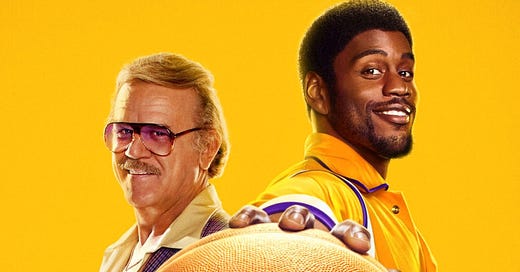




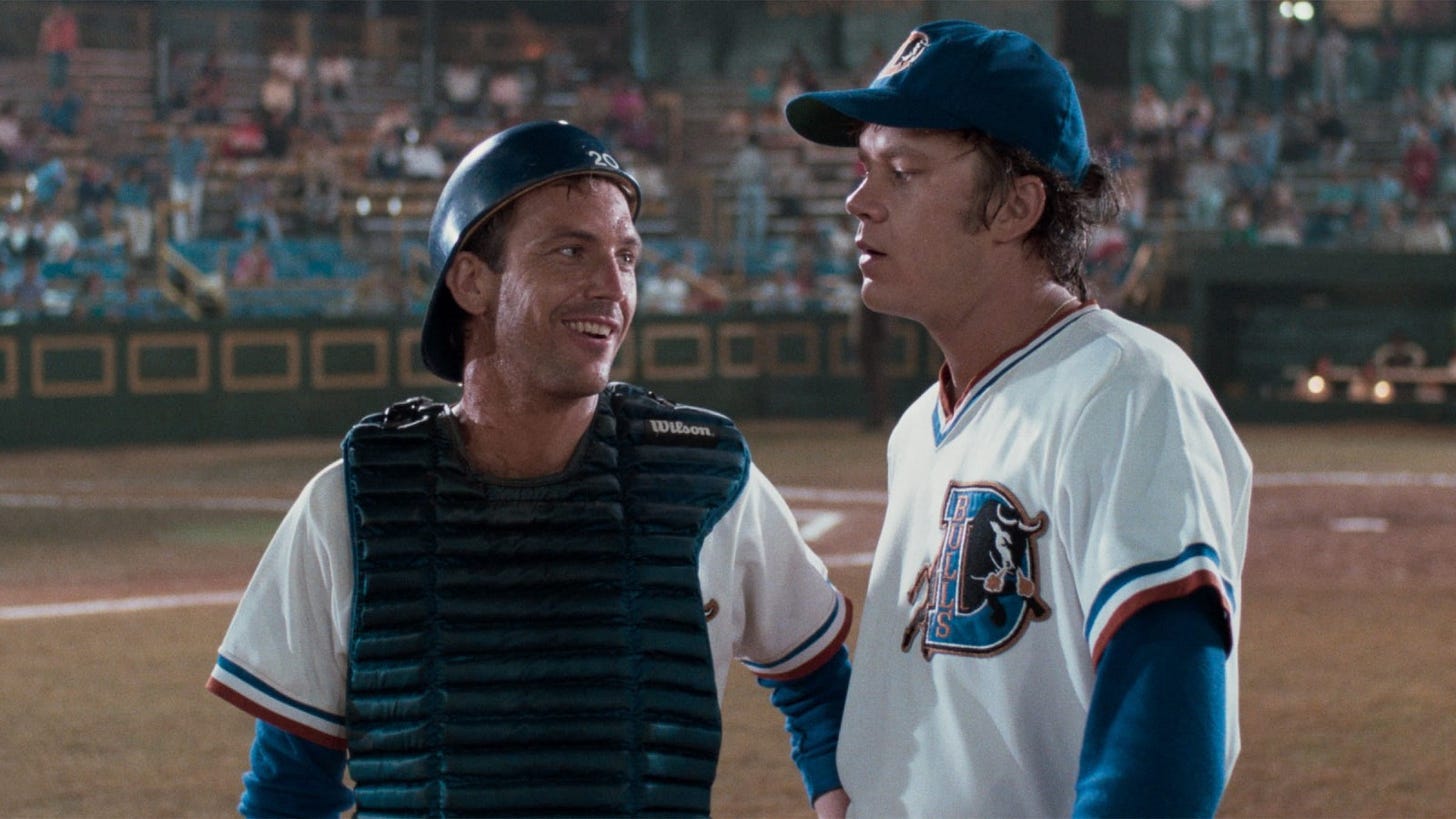
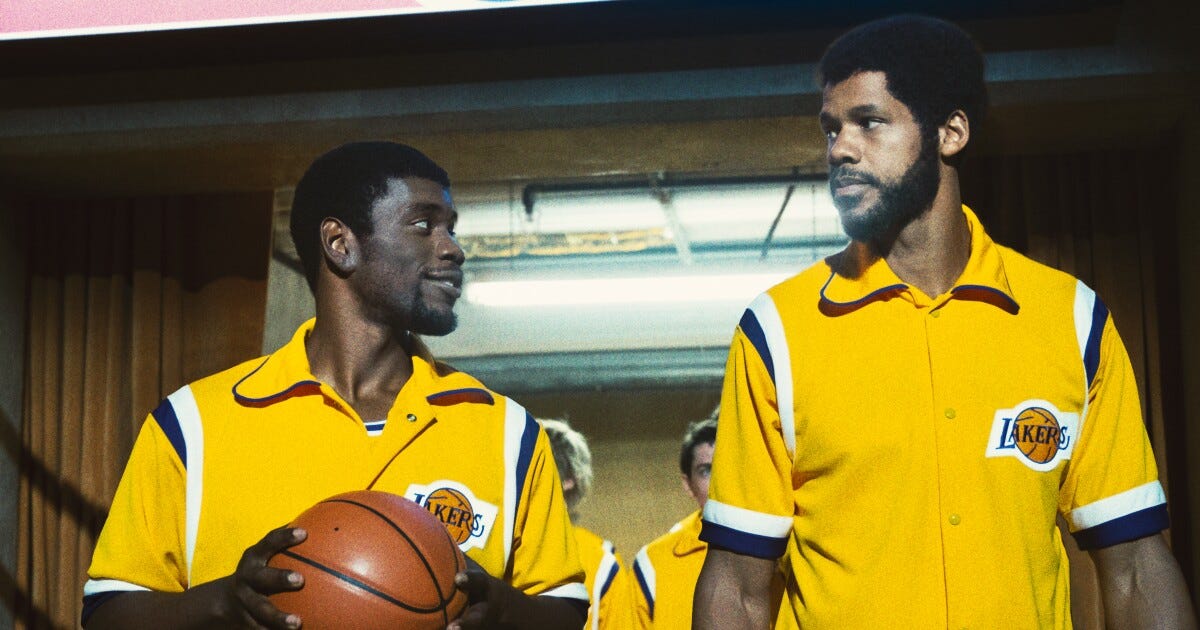

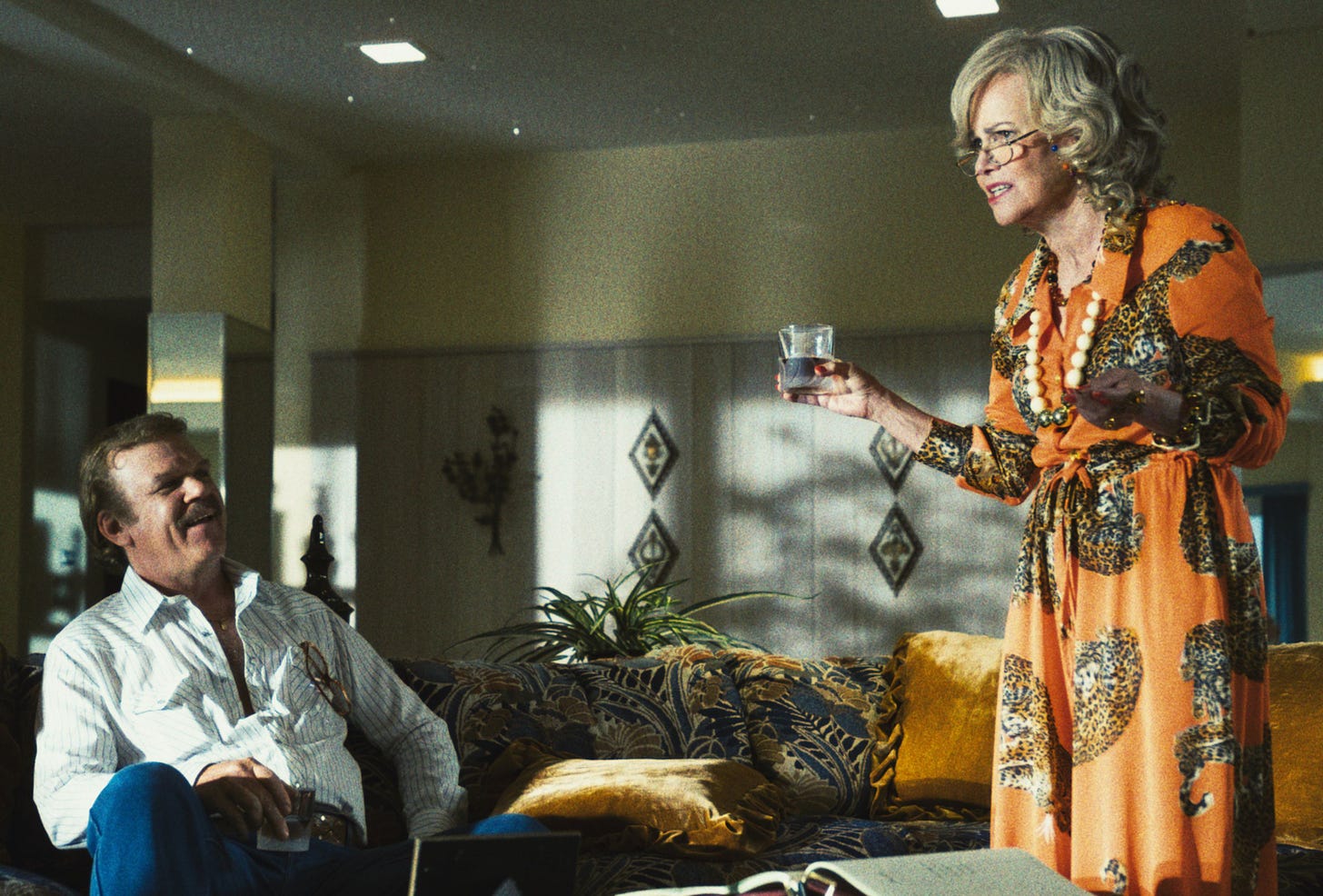
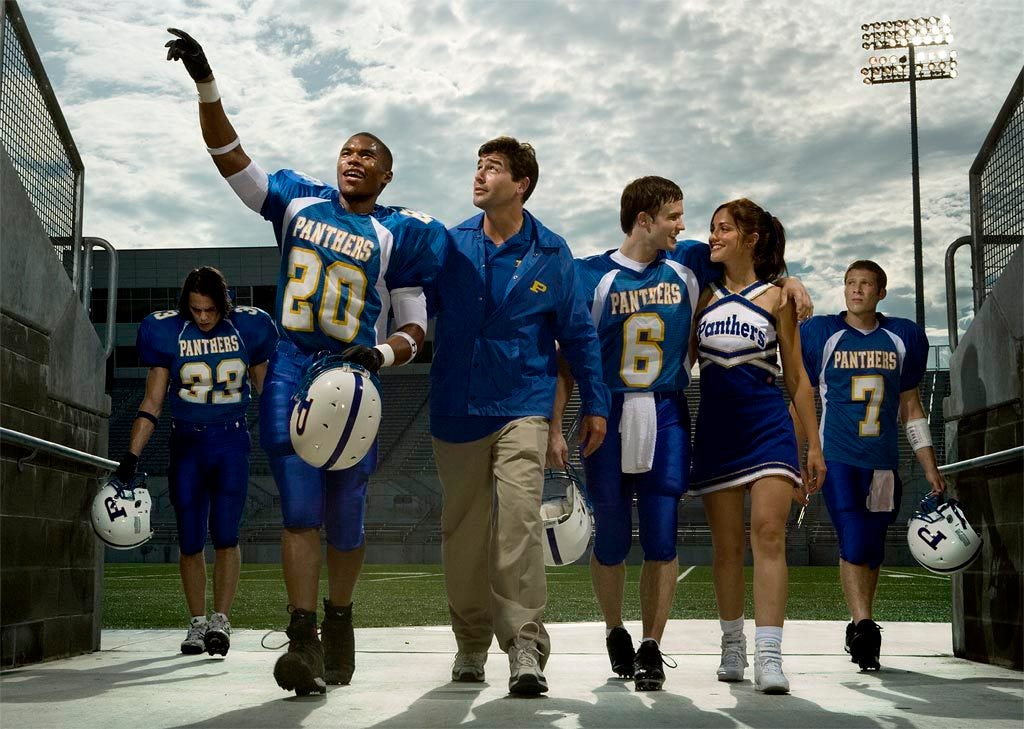
Can’t wait to see it. I had forgotten the cellophane man he was perfect in that role too.